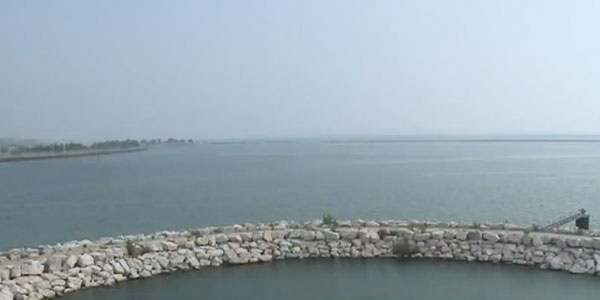Great Lakes Polluted By Caffeine, Triclosan In Chemical Mixture Soup

Wastewater treatment processes and their relation to wildlife living in the Great Lakes has been studied recently, and the results are a little unsettling if not downright dirty. A study related to the University of Wisconsin-Milwaukee’s School of Freshwater Sciences found that there is cause for environmental concern when it comes to dumping chemicals in the lakes. The new study found that aquatic life in Lake Michigan has been exposed to at least 27 chemicals that were before thought to be diluted once they hit the lake. Of these chemicals, 14 pharmaceuticals and personal care products found in the water were found to pose medium to high ecological risk.
The compounds found in the water include both familiar and unfamiliar varieties. Among the four most highly found compounds in the water was caffeine. The other three rounding out the top four are of the harder to pronounce variety, including metformin, sulfamethoxazole, and triclosan. According to Environmental Health News, the chemicals could be found in the water several miles out from the shoreline, with metformin traces being found more than other pharmaceutical traces. Triclosan, found in toothpastes, was also prominent, and has been found in the past to be toxic to algae and troublesome to some fish species.
The problem is that wastewater plants haven’t spent time looking into ways of removing these sorts of chemicals. Obvious threats are taken out of the water before it is re-released, but caffeine doesn’t really rank all that highly. While the U.S. Environmental Protection Agency believes that pharmaceuticals might emerge to be a concern, not a lot has been done in terms of regulating freshwater from pharmaceuticals. In fact, there are no federal regulations of the compounds found in either wastewater or drinking water.
But capturing the compounds can even be a problem, with research hydrologist Dana Kolpin explaining the freshwater bodies are like a soup.
“The problem is the effluent and water don’t have one compound but a chemical mixture soup. It’s going to be hard to tease out which of these compounds may do harm” to people or fish.”
While the pharmaceuticals in the water probably won’t cause the fish to die, they could cause other changes in the way fish behave, live, and eat. The only good news out of this whole thing is that the same pharmaceuticals were not found in the drinking water that came from the lake. All the same, you have to feel a little bad for the fishies.
CINEMABLEND NEWSLETTER
Your Daily Blend of Entertainment News

Jessica Rawden is Managing Editor at CinemaBlend. She’s been kicking out news stories since 2007 and joined the full-time staff in 2014. She oversees news content, hiring and training for the site, and her areas of expertise include theme parks, rom-coms, Hallmark (particularly Christmas movie season), reality TV, celebrity interviews and primetime. She loves a good animated movie. Jessica has a Masters in Library Science degree from Indiana University, and used to be found behind a reference desk most definitely not shushing people. She now uses those skills in researching and tracking down information in very different ways.
Hunger Games Fans Can't Stop Talking About How The Sunrise On The Reaping Casting Connects To Rachel Zegler's Character
I Loved Daredevil: Born Again's Finale, But It Highlighted What The Rest Of Season 1 Was Missing
Jack Black, Dax Shepard, Josh Lucas And More Are As Excited About That SNL End Of Season 50 Hosting News As I Was









